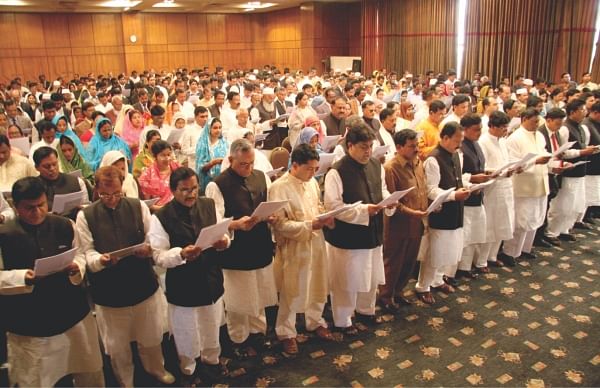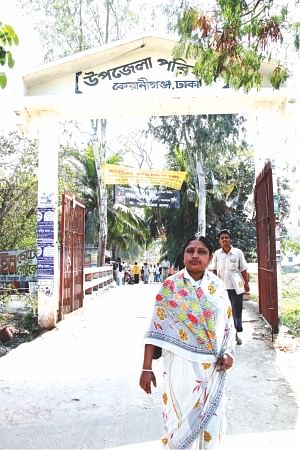| Home - Back Issues - The Team - Contact Us |
 |
| Volume 10 |Issue 39 | October 14, 2011 | |
|
|
Special Feature Promises Broken The Awami League might have to pay a heavy price in the next elections for Shakhawat Liton Firoz Kabir was elected chairman of Savar upazila parisahd for the third time in January 2009. He was elected chairman in the previous two polls–in 1985 and in 1990. He clearly remembers that he was very busy with the parishad's activities during his previous two terms as chairman. He had little time to attend social programmes frequently. But this time, he is freer than ever. "I don't have work to keep myself busy with. So, I attend a huge number of social and family programmes," Kabir has told The Star last Saturday over telephone. Kabir, also vice-president of Dhaka district unit of Awami League, says he attends his office at upazila parishad complex in the morning. He meets local people everyday and chit-chats with them for a few hours. He, however, cannot assure them of doing the welfare works they request him to do as he does not have the authority over development activities. He says he does not have much work at his office as the Upazila Nirbahi Officer (UNO), who is legally secretary to the parishad, dominates most of the activities. So, after a few hours of chit-chat, he leaves office and attends some social programmes, if there is any.
"In fact, I am always in a holiday mood. And I cruise around in the car the government has given me," Kabir says sarcastically expressing his frustration with the government's way of keeping the upazila parishad dysfunctional. "The government should rather dissolve the upazila parishad. There is no meaning in keeping such a dysfunctional body." Matiur Rahman Akand, chairman of Pirojpur Sadar upazila, Sirajul Islam Bhuiyan, chairman of Nandail upazila parisahd, Mymensingh, have echoed Kabir's views, expressing their frustration at the current state of the parishads. Talking to The Star, they also describe how people's expectations of having a vibrant upazila parishad system have remained unfulfilled in the last 33 months since the beginning of its journey after a long break. Promises Broken But the ruling AL-led government took less than three months to upset people's expectations and it began a backward journey forgetting its electoral pledge to strengthen the upazila parishad system. "Local governments of districts and upazilas will be made self-reliant and autonomous and they will play pivotal roles in local development," says the ruling AL's election manifesto that contributed hugely to its landslide victory in the December 29, 2008 parliamentary elections. In the manifesto styled "Charter for Change", AL also promised to bring massive changes to the political structure giving emphasis on the local government system. Union parishads, upazila parishads, and zila parishads will be strengthened by decentralising the power, it asserts. But in reality the upazila parishad bill that was passed in the parliament on April 6, 2009 to reintroduce the Upazila Parishad Act of 1998 with some amendments has empowered local MPs to meddle in the functioning of the local government body. As the law made them advisers to the parishads in their constituencies, the parishads have to "accept the suggestions of the lawmakers". Moreover, the parishads are not allowed to send development plans to the government for implementation without recommendations from lawmakers. Through the amendments, the AL-led government prevented the parishads from becoming self reliant and autonomous, as they are not allowed to perform without the 'suggestions' of lawmakers. Not only that, the AL-led government also ignored a Supreme Court (SC) verdict delivered in April 2006 on a writ petition titled "Anwar Hossain Manju versus the government of Bangladesh". In the verdict, the High Court division of SC has said the scheme of the constitution is that MPs and ministers would perform their functions centrally, keeping in broad view the necessity of the country as a whole while functioning of the local government bodies envisaged under Articles 59 and 60, shall be confined to the needs of the local area." The court also asserted,"…The members of parliament have got no direct role or function, in respect of either development or maintenance of law and order, in the district or in other local administrative units." As per article 59 of the constitution, the upazila parishads are designated to perform significant functions relating to administration and the work of public officers, maintenance of public order, preparation and implementation of plans relating to public services and economic development. According to article 60, to give the provisions of the previous article full effect, parliament shall, by law, confer powers on the local government bodies, including the power to impose taxes for local purposes, to prepare their budgets and maintain funds. In line with the constitutional provision, the upazila parishad act specifically put local wings or departments of a good number of ministries under the jurisdiction of upazila parishads. So, there is no lax of legal provisions to strengthen the upazila parishads. But there is a lack of government will to translate the spirit of the laws into actions and therefore, the reality is completely frustrating. MPs are doing and supervising all the things in their respective constituencies to strengthen their base, ignoring the jurisdictions of upazila parishads. UNOs are cooperating with MPs to prevent upazila chairmen from taking control over the parishads' activities. Some upazila chairmen have even alleged that the UNOs are acting carefully to widen the gap between MPs and upazila chairmen for their personal interests. They have said that even the Local Government and Rural Development ministry has issued some circulars favouring UNOs and field level government officials, instead of making the upazila parishad functional. "Being advisers of upazila parishads, MPs are literally doing the work of upazila chairmen," says Matiur Rahman Akand. “We are Puppets!” "Two vice-chairmen of my upazila parishad could not sign any official documents. The male vice-chairmen finally stopped attending office regularly," says Matiur. Shahnaz Parveen, who was elected vice-chairman, a post reserved for women to Gafargaon upazila parishad of Mymensingh, says that she has stopped attending office regularly. "Nowadays I attend office twice or thrice a week. I stay sometimes at my office and then leave," Shahnaz told The Star. She says that she does not have any work to do. "Even at the monthly meetings of the parishad, I just sit there like a puppet as I do not have any specific role to play." Shahnaz, also a practicing lawyer, says she dreamt of building her political career through working for people as a vice-chairman. "I may not contest in the polls next time. I feel ashamed to face people as I couldn't do anything for them." An Opportuniy Lost
Military ruler Gen HM Ersahd introduced the system in 1982 and used and abused it effectively to consolidate his power at the grassroots as his predecessor Ziaur Rahman did by using other local government bodies. Zia, in fact, closely followed military dictator Ayub Khan's footsteps who, in the Pakistan period gave priority over securing the support of local body representatives. The upazila system was introduced in 1982, but the first upazila parishad elections were held in May 1985. In the absence of parliament, upazila chairmen enjoyed the power, prestige and status of MPs during the martial law regime of Ershad. Later, the presence of MPs gradually reduced the power of the upazila chairmen. And finally, it was the then BNP government that dissolved the system in 1991. The AL-led government reintroduced the upazila system through enactment of the upazila law in 1998. And the long over-due polls were held finally in January 2009 at the beginning of the AL-led government regime, but it could not cash the huge potential of the upazila parishads. It is expected that an elected government will not abuse the local government bodies like military rulers and make them ineffective. But the AL-led democratic government seems to have lost the opportunity to use the huge workforces--upazila parishads– an integrated part of the central government--for achieving something extraordinary as 85 percent of total upazila chairmen are involved with AL politics. Not only that, the government's strategy that turned upazila dysfunctional has annoyed upazila chairmen who might not be very accommodating to the AL high commands in the next parliamentary polls. According to Firoz Kabir, Matiur Rahman, Sirajul Islam and Shahnaj Parveen, the government is losing its popularity because it has failed to make the upazila parishad functional. "I fear that the party will suffer immensely in the next parliamentary elections for making the upazila parishad dysfunctional," says Matiuar, who is also president of sadar upazila unit of AL. The writer is Senior Reporter, The Daily Star.
Copyright
(R) thedailystar.net 2011 |

